As I wrote in my last post I attended Fossetcon this past weekend. The core of the event kicked off on Friday with a keynote by Iris Gardner on how Diversity Creates Innovation and the work that the CODE2040 organization is doing to help talented minorities succeed in technology. I first heard about this organization back in 2013 at OSCON, so it was great to hear more about their recent successes with their summer Fellows Program. It was also great to hear that their criteria for talent not only included coding skills, but also sought out a passion for engineering and leadership skills.
After a break, I went to see PJ Hagerty give his talk, Meetup Groups: Act Locally – Think Globally. I’ve been running open source related groups for over a decade, so I’ve been in this space for quite a long time and was hoping to get some new tips, PJ didn’t disappoint! He led off with the need to break out of the small “pizza and a presentation by a regular” grind, which is indeed important to growing a group and making people show up. Some of his suggestions for doing this included:
- Seek out students to attend and participate in the group, they can be some of your most motivated attendees and will bring friends
- Seek out experienced programmers (and technologists) not necessarily in your specific field to give more agnostic talks about general programming/tech practices
- Do cross-technology meetups – a PHP and Ruby night! Maybe Linux and BSD?
- Bring in guest speakers from out of town (if they’re close enough, many will come for the price of gas and/or train/bus ticket – I would!)
- Send members to regional conferences… or run your own conference
- Get kids involved
- Host an OpenHack event
I’ll have to see what my co-conspiratorsorganizers at some local groups think of these ideas, it certainly would be fun to spice up some of the groups I regularly attend.
From there I went to MySQL Server Performance Tuning 101 by Ligaya Turmelle. Her talk centered around the fact that MySQL tuning is not simple, but went through a variety of mechanisms to tune it in different ways for specific cases you may run into. Perhaps most useful to me were her tips for gathering usage statistics from MySQL, I was unfamiliar with many of the metrics she pulled out. Very cool stuff.
After lunch and some booth duty, I headed over to Crash Course in Open Source Cloud Computing presented by Mark Hinkle. Now, I work on OpenStack (referred to as the “Boy Band” of cloud infrastructures in the talk – hah!), so my view of the cloud world is certainly influenced by that perspective. It was great to see a whirlwind tour of other and related technologies in the open source ecosystem.
The closing keynote for the day was by Deb Nicholson, Style or substance? Free Software is Totally the 80’s. She gave a bit of a history of free software and speculated as to whether our movement would be characterized by a shallow portrayal of “unconferences and penguin swag” (like 80s neon clothes and extravagance) or how free software communities are changing the world (like groups in the 80s who were really seeking social change or the fall of the Berlin wall). Her hope is that by stepping back and taking a look at our community that perhaps we could shape how our movement is remembered and focus on what is important to our future.
Saturday I had more booth duty with my colleague Yolanda Robla who came in from Spain to do a talk on Continuous integration automation. We were joined by another colleague from HP, Mark Atwood, who dropped by the conference for his talk How to Get One of These Awesome Open Source Jobs – one of my favorites.
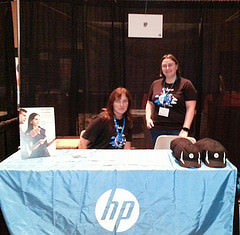
The opening keynote on Saturday was Considering the Future of Copyleft by Bradley Kuhn. I always enjoy going to his talks because I’m considerably more optimistic about the health and future of free software, so his strong copyleft stance makes me stop and consider where I truly stand and what that means. He worries that an ecosystem of permissive licenses (like Apache, MIT, BSD) will lead to companies doing the least possible for free software and keeping all their secret sauces secret, diluting the ecosystem and making it less valuable for future consumers of free software since they’ll need the proprietary components. I’m more hopeful than that, particularly as I see real free software folks starting to get jobs in major companies and staying true to their free software roots. Indeed, these days I spend a vast majority of my time working on Apache-licensed software for a large company who pays me to do the work. Slides from his talk are here, I highly recommend having a browse: http://ebb.org/bkuhn/talks/FOSSETCON-2014/copyleft-future.html
After some more boothing, I headed over to Apache Mesos and Aurora, An Operating System For The Datacenter by David Lester. Again, being on the OpenStack bandwagon these past few years I haven’t had a lot of time to explore the ecosystem elsewhere, and I learned that this is some pretty cool stuff! Lester works for Twitter and talked some about how Twitter and other companies in the community are using both the Mesos and Aurora tools to build their efficient, fault tolerant datacenters and how it’s lead to impressive improvements in the reliability of their infrastructures. He also did a really great job explaining the concepts of both, hooray for diagrams. I kind of want to play with them now.
Introduction to The ELK Stack: Elasticsearch, Logstash & Kibana by Aaron Mildenstein was my next stop. We run an ELK stack in the OpenStack Infrastructure, but I’ve not been very involved in the management of that, instead focusing on how we’re using it in elastic-recheck so I hoped this talk would fill in some of the fundamentals for me. It did do that so I was happy with that, but I have to admit that I was pretty disappointed to see demos of plugins that required a paid license.
As the day wound down, I finally had my talk: Code Review for Systems Administrators.
I love giving this talk. I’m really proud of the infrastructure that has been built for OpenStack and it’s one that I’m happy and excited to work with every day – in part because we do things through code review. Even better, my excitement during this presentation seemed contagious, with an audience that seemed really engaged with the topic and impressed. Huge thanks to everyone who came and particularly to those who asked questions and took time to chat with me after. Slides from my talk are available here: fossetcon-code-review-for-sysadmins/
And then we were at the end! The conference wrapped up with a closing keynote on Open Source Is More than Code by Jordan Sissel. I really loved this talk. I’ve known for some time that the logstash community was one of the friendlier ones, with their mantra of “If a newbie has a bad time, it’s a bug.” This talk dove further into that ethos in their community and how it’s impacted how members of the project handle unhappy users. He also talked about improvements made to documentation (both inline in code and formal documentation) and how they’ve tried to “break away from text” some and put more human interaction in their community so people don’t feel so isolated and dehumanized by a text only environment (though I do find this is where I’m personally most comfortable, not everyone feels that way). I hope more projects will look to the logstash community as a good example of how we all can do better, I know I have some work to do when it comes to support.
Thanks again to conference staff for making this event such a fun one, particularly as it was their first year!


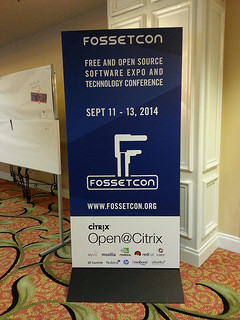
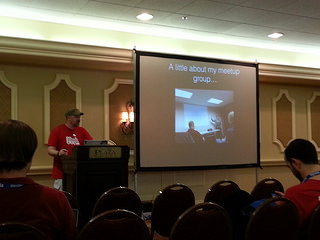
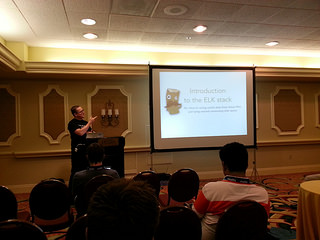
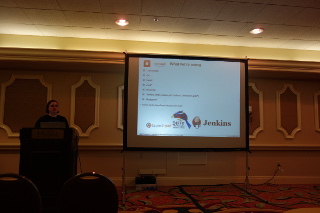
Wednesday, Sep 17th, 2014 at 15:05
Sounds like a great conference. I had not heard of it before.